AP count: Hillary Clinton has delegates to win Democratic nomination
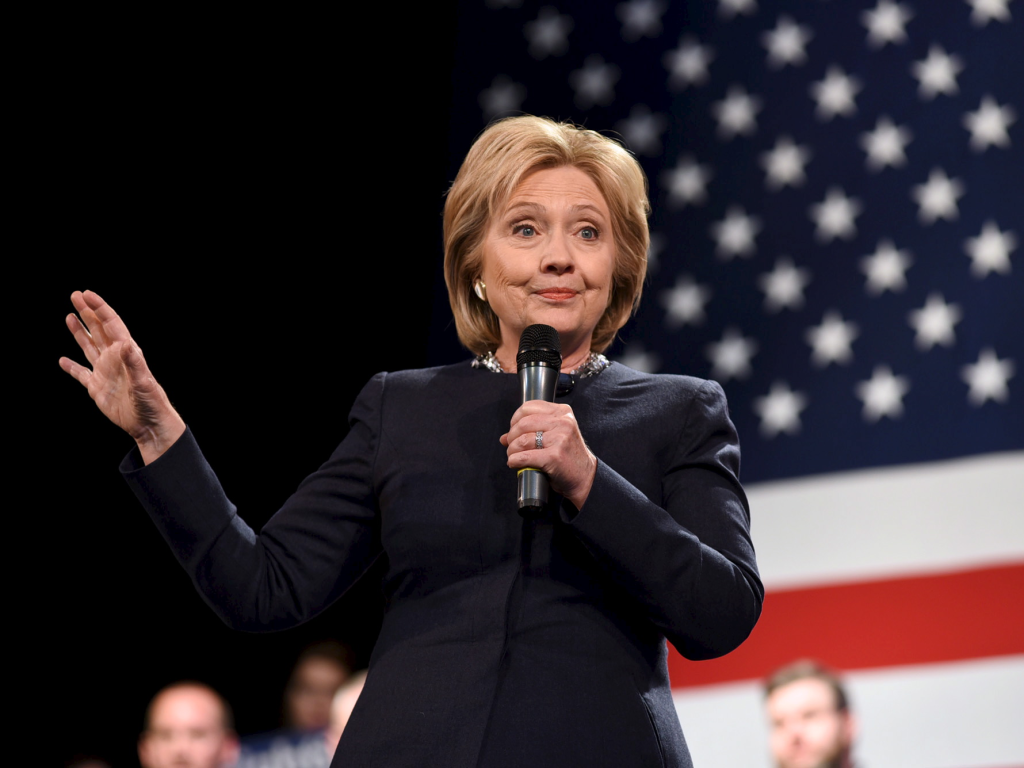
Striding into history, Hillary Clinton will become the first woman to top the presidential ticket of a major U.S. political party, capturing commitments Monday from the number of delegates needed to become the Democrats’ presumptive nominee. The victory arrived nearly eight years to the day after she conceded her first White House campaign to Barack Obama. Back then, she famously noted her inability to “shatter that highest, hardest glass ceiling.” Campaigning this time as the loyal successor to the nation’s first black president, Clinton held off a surprisingly strong challenge from Vermont Sen. Bernie Sanders. He mobilized millions with a fervently liberal message and his insurgent candidacy revealed a deep level of national frustration with politics-as-usual, even among Democrats who have controlled the White House since 2009. Clinton, the former secretary of state, New York senator and first lady, reached the 2,383 delegates needed to become the presumptive Democratic nominee Monday with a decisive weekend victory in Puerto Rico and a burst of last-minute support from superdelegates. Those are party officials and officeholders, many of them eager to wrap up the primary amid preference polls showing her in a tightening race with presumptive GOP nominee Donald Trump. Clinton has 1,812 pledged delegates won in primaries and caucuses. She also has the support of 571 superdelegates, according to an Associated Press count. The AP surveyed all 714 superdelegates repeatedly in the past seven months, and only 95 remain publicly uncommitted. While superdelegates will not formally cast their votes for Clinton until the party’s July convention in Philadelphia, all those counted in her tally have unequivocally told the AP they will do so. “We really need to bring a close to this primary process and get on to defeating Donald Trump,” said Nancy Worley, a superdelegate who chairs Alabama’s Democratic Party and provided one of the last endorsements to put Clinton over the top. Clinton outpaced Sanders in winning new superdelegate endorsements even after his string of primary and caucus wins in May. Following the results in Puerto Rico, it is no longer possible for Sanders to reach the 2,383 needed to win the nomination based on the remaining available pledged delegates and uncommitted superdelegates. Sanders said this past weekend he plans to fight on until the convention, promising to make the case to superdelegates that he is better positioned to beat Trump in November. Superdelegates can change their minds. But since the start of the AP’s survey in late 2015, no superdelegates have switched from supporting Clinton to backing Sanders. Indeed, Clinton’s victory is broadly decisive. She leads Sanders by more than 3 million cast votes, by 291 pledged delegates and by 523 superdelegates. She won 29 caucuses and primaries to his 21 victories. That’s a far bigger margin than Obama had in 2008, when he led Clinton by 131 pledged delegates and 105 superdelegates at the point he clinched the nomination. Echoing the sentiments of California Gov. Jerry Brown, who overcame a decades-long rivalry with the Clinton family to endorse her last week, many superdelegates expressed a desire to close ranks around a nominee who could defeat Trump in November. “It’s time to stand behind our presumptive candidate,” said Michael Brown, one of two superdelegates from the District of Columbia who came forward in the past week to back Clinton before the city’s June 14 primary. “We shouldn’t be acting like we are undecided when the people of America have spoken.” Though she marched into her second presidential primary campaign as an overwhelming favorite, Clinton could not shake Sanders until its final days. He campaigned aggressively in California ahead of the state’s Tuesday election, unwilling to exit a race Clinton stood on the cusp of winning. Beyond winning over millions of Sanders supporters who vow to remain loyal to the self-described democratic socialist, Clinton faces challenges as she turns toward November, including criticism of her decision to use a private email server run from her New York home while serving as secretary of state. Her deep unpopularity among Republicans has pushed many leery of Trump to nevertheless embrace his campaign. “This to me is about saving the country and preventing a third progressive, liberal term, which is what a Clinton presidency would do,” House Speaker Paul Ryan told the AP last week after he finally endorsed Trump, weeks after the New Yorker clinched the GOP nomination. Yet Clinton showed no signs of limping into the general election as she approached the milestone, leaving Sanders behind and focusing on lacerating Trump. She said electing the billionaire businessman, who has spent months hitting her and her husband with bitingly personal attacks, would be a “historic mistake.” “He is not just unprepared. He is temperamentally unfit to hold an office that requires knowledge, stability and immense responsibility,” Clinton said last week in a speech that was striking in its forcefulness, previewing a brutal five-month general election campaign to come. Even without the nomination, Sanders can claim ideological victory. His liberal positions pushed the issue of income inequality into the spotlight and drove Clinton to the left on issues such as trade, Wall Street and campaign finance reform. But she prevailed, in part, by claiming much of the coalition that boosted Obama. She won overwhelming support from women and minorities, catapulting her to decisive victories in diverse, delegate-rich states such as New York and Texas. When Clinton launched her campaign last April, she did so largely unopposed, having scared off more formidable challengers by locking down much of the party’s organizational and fundraising infrastructure. Vice President Joe Biden, seen as her most threatening rival, opted not to run in October. Of the four opponents who did take her on, Sanders was the only one who emerged to provide a serious challenge. He caught fire among young voters and independents, his campaign gaining momentum from a narrow loss in Iowa in February and a commanding victory in New Hampshire. His ability to raise vast sums of money online gave him the resources to continue into the spring. But
Hillary Clinton, Bernie Sanders make final pushes ahead of New York primary
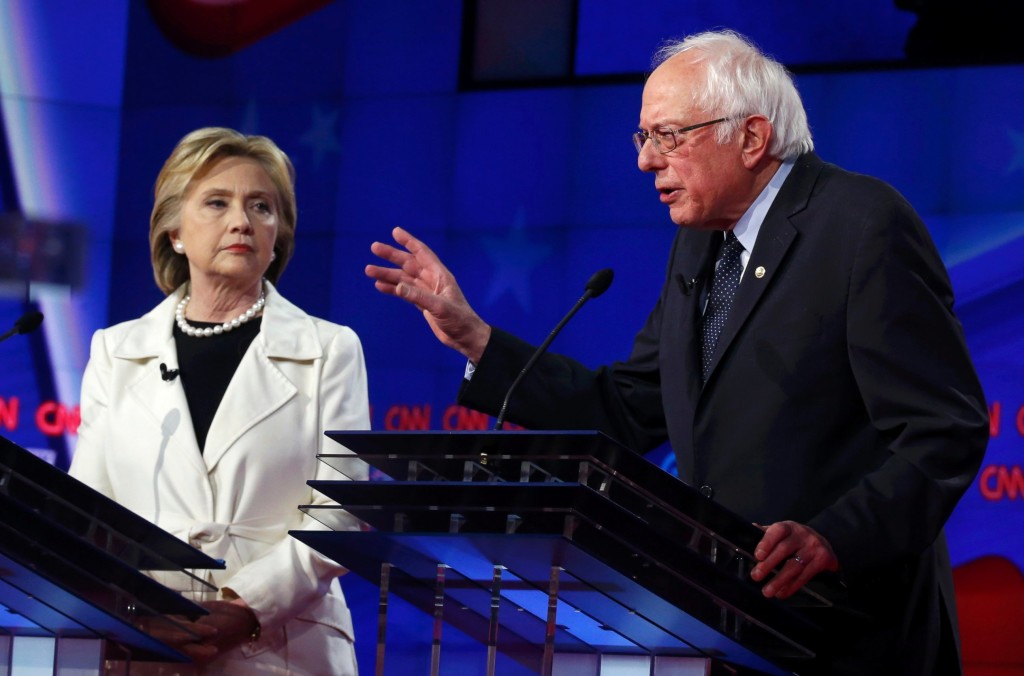
Hillary Clinton greeted recently-unionized workers at a Queens car wash during her final day of campaigning ahead of the New York primary. Clinton cited the workers as evidence of how “real change happens.” “It didn’t happen overnight,” she told a small crowd at the Hi-Tek Wash & Lube. “You work at it every day.” The remark echoes her recent attacks on rival Bernie Sanders, who she says promises an impossible-to-achieve “political revolution.” Earlier on Monday, she stopped at a hospital in Yonkers and urged workers to support her at the polls. Clinton will join New York Senator Kirsten Gillibrand for a rally in the afternoon. Clinton also said the White House should take a “hard look” at whether to declassify 28 pages of the 9/11 commission report. Families of victims and some members of Congress say the government has suppressed information about the attack. Clinton is campaigning with Sen. Charles Schumer, who joined the effort. She’s also backing legislation that would allow the Saudi government to be held responsible for any role in the attacks in US courts. Meanwhile, Sanders is backing legislation that would let Americans sue Saudi Arabia over the 9/11 terrorist attacks. The bill is opposed by the Obama administration but is important to families of 9/11 victims, some of whom believe Saudi officials played some part in the attacks. Sanders spoke in favor of the legislation, saying it’s important to have a full understanding of the “the possible role of the Saudi government in 9/11.” U.S. inquiries have not reported a link between the Saudi government or its senior officials and the attacks. But Sanders notes that some conclusions remain classified. Sanders says Saudi Arabia promotes an extreme and “very destructive” version of Islam. Fifteen of the 19 hijackers in the September 2001 attacks, which destroyed the World Trade Center and killed thousands, were citizens of Saudi Arabia. Republished with permission of the Associated Press.
Donald Trump, Hillary Clinton continue dominance in 2016 primaries
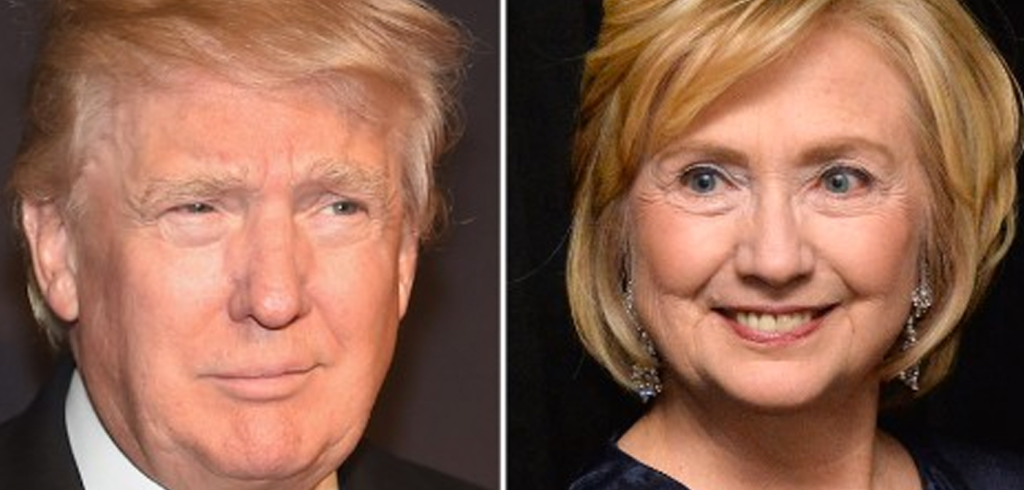
Republican front-runner Donald Trump swept to victory in the Mississippi and Michigan presidential primaries Tuesday, deepening his grip on the GOP nominating contest despite fierce efforts to block his path. Democrat Hillary Clinton easily carried Mississippi but was locked in a close race with rival Bernie Sanders in Michigan. The primaries offered Trump and Clinton a chance to pad their leads and start turning toward the general election. But Sanders was hoping to prevent a Clinton coronation with a strong showing in Michigan, the night’s biggest prize and the first Midwestern industrial state to vote in the 2016 race. With votes in Michigan still being counted, Clinton glossed over race with Sanders and jabbed at the Republicans and their chaotic nomination fight. “Every time you think it can’t get any uglier, they find a way,” she said. “As the rhetoric keeps sinking lower, the stakes in this election keep rising.” Trump, too, turned an eye toward the Democrats and November, emphasizing the importance of helping Republican senators and House members get elected in the fall. Having entered Tuesday’s contests facing a barrage of criticism from rival candidates and outside groups, he reveled in overcoming the attacks. “Every single person who has attacked me has gone down,” Trump said at one of his Florida resorts. In his typically unorthodox style, the billionaire was flanked by tables packed with his retail products, including steaks, bottled water and wine. While a handful of recent losses to Texas Sen. Ted Cruz have raised questions about Trump’s durability, Tuesday’s contests marked another lost opportunity for rivals to slow his momentum. Next week’s winner-take-all primaries in Ohio and Florida loom especially large as perhaps the last chance to stop him short of a long-shot contested convention fight. Ohio Gov. John Kasich was in a fight for second place in Michigan and hoping for a boost heading into next week’s crucial contest in his home state. For Florida Sen. Marco Rubio, a favorite of Republican elected officials, Tuesday marked the latest in a series of disappointing nights. He emerged from Michigan and Mississippi with no delegates. Rubio insisted he would press on to his home state’s primary in Florida. “It has to happen here, and it has to happen now,” Rubio told supporters Tuesday during a rally in Sarasota. If Rubio and Kasich can’t win at home, the GOP primary appears set to become a two-person race between Trump and Cruz. The Texas senator is sticking close to Trump in the delegate count and with six states in his win column, he’s argued he’s the only candidate standing between the brash billionaire and the GOP nomination. During a campaign stop at a North Carolina church Tuesday, Cruz took on Trump for asking rally attendees to pledge their allegiance to him. He said the move strikes him as “profoundly wrong” and is something “kings and queens demand” of their subjects. “I’m not here asking any of you to pledge your support of me,” Cruz said, to thunderous applause and cheers. “I’m pledging my support of you.” Republicans were also holding contests Tuesday in Hawaii and Idaho. GOP candidates were fighting for 150 delegates, while 179 Democratic delegates were at stake in the party’s two primaries. The economy ranked high on the list of concerns for voters heading to the polls in Michigan and Mississippi. At least 8 in 10 voters in each party’s primary said they were worried about where the American economy is heading, according to exit polls conducted by Edison Research for The Associated Press and television networks. Among Democrats, 8 in 10 voters in both states said the country’s economic system benefits the wealthy, not all Americans. Sanders has sought to tap into that concern, energizing young people and white, blue-collar voters with his calls for breaking up Wall Street banks and making tuition free at public colleges and universities. Michigan, with big college towns and a sizeable population of working-class voters, should be a good fit for him. But Clinton has led in polling. The results in Mississippi underscored Clinton’s overwhelming strength with black voters and Sanders’ stunning inability to draw support from voters who are crucial to Democrats in the general election. Clinton carried nearly 9 in 10 black voters in Mississippi, mirroring her margins in other Southern states with large African-American populations. With Tuesday’s wins, Trump leads the Republican field with 428 delegates, followed by Cruz with 315, Rubio with 151 and Kasich with 52. Winning the GOP nomination requires 1,237 delegates. Among Democrats, Clinton had accumulated 1,134 delegates and Sanders 502, including superdelegates. Democrats need 2,383 delegates to win the nomination. Republished with permission of the Associated Press.
Hillary Clinton wins Democratic primary in Mississippi

Hillary Clinton has won the Democratic presidential primary in Mississippi, riding a continuing wave of support from black voters in Southern states to claim her latest victory over Bernie Sanders. The former secretary of state will proportionally be awarded a share of the state’s 36 delegates. Clinton had already earned 1,134 delegates in previous contests, versus 502 that have gone to Sanders. Clinton’s number is roughly half the amount she needs to clinch the Democratic nomination for president. Her win in Mississippi comes off weekend contests in which Sanders won three out of four states. Republished with permission of the Associated Press.
Bernie Sanders fundraising request draws $5 million in one day
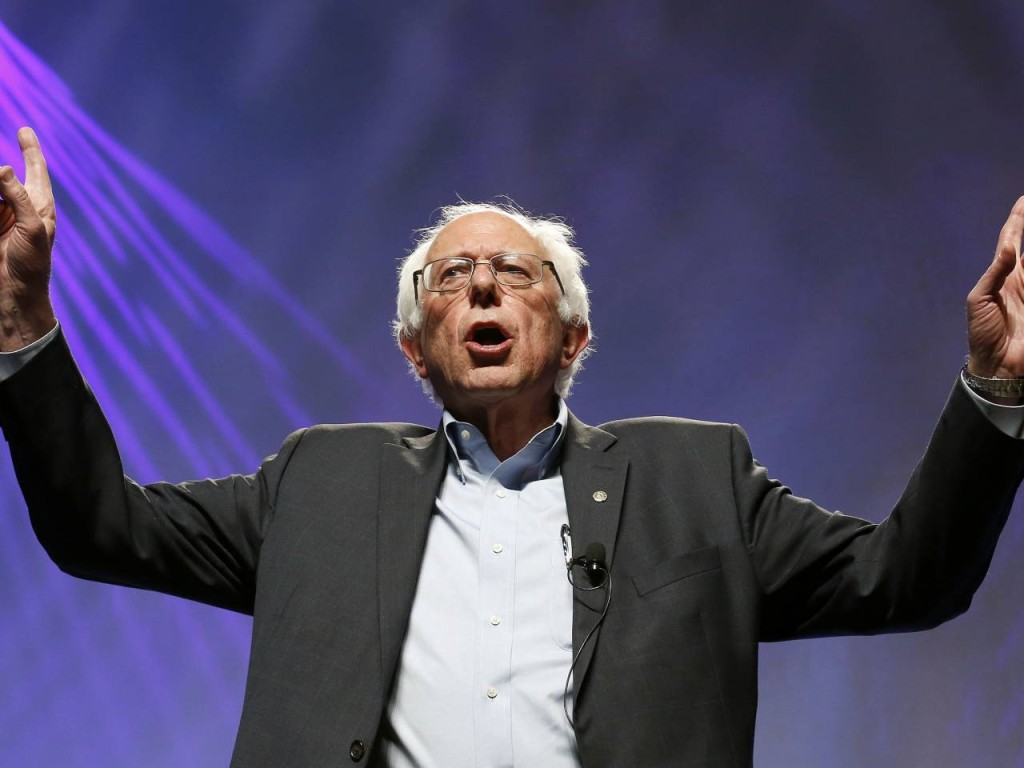
Bernie Sanders raised more than $5 million Monday by simply asking his network of small donors for more money. In the morning, his campaign announced it had raised $36 million in February, and he set a goal of hitting $40 million by the end of the day. A website tracking the fundraising effort shows the campaign had exceeded $41 million by Monday evening. Sanders bested Democratic presidential rival Hillary Clinton in January fundraising. He will have to file February’s campaign finance reports by March 20, a due date for all candidates. Those documents will show how much money he has left for his presidential bid. Republished with permission of the Associated Press.
Presidential contenders fight for minority voters in South Carolina
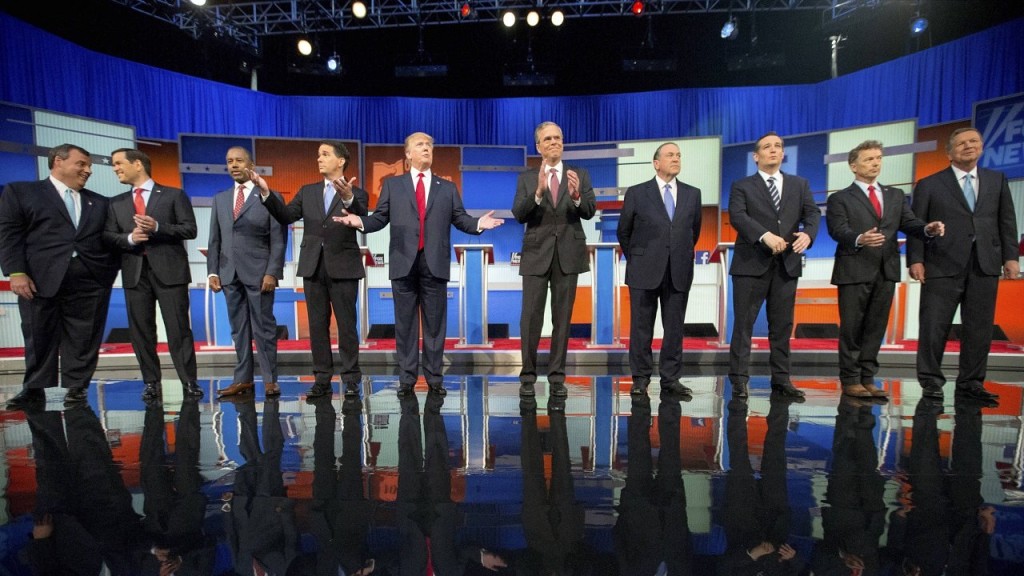
Presidential candidates in both parties battled for the crucial backing of blacks and Hispanics on Friday as the race shifted toward states with more minority voters. Republicans crisscrossed South Carolina looking to derail billionaire Donald Trump and Texas Sen. Ted Cruz, who each came to the state with a burst of momentum after the first two nomination contests. Several candidates embraced the chaos as they felt out the best strategies to survive South Carolina and advance into a grueling March primary schedule, when 58 percent of the party’s delegate total will be at stake. Former Florida Gov. Jeb Bush was embracing his family ties. Bush on Friday defended his decision to bring his brother, former President George W. Bush, to South Carolina to help him campaign. Speaking to ABC’s “Good Morning America,” Jeb Bush said recruiting the former president wasn’t a sign of desperation, as Trump has suggested. George W. Bush, who is slated to campaign for his brother on Monday, left the White House in January 2009 with low approval ratings. “This is the beginning of the campaign,” and “for my brother to speak on behalf of the skills I have to lead this country will be quite helpful,” Jeb Bush said. He later picked up the endorsement of South Carolina’s former first lady Iris Campbell, a longtime Bush family ally. Bush’s rival in the fight for the moderate establishment was still introducing himself to South Carolina voters. In a new biographical ad, Ohio Gov. John Kasich notes that his parents’ death in a drunk-driving crash in 1987 “transformed” him and helped him find his faith. A second new ad promises a whirlwind of activity in the first 100 days of a Kasich presidency — “no excuses, no surrender,” says a narrator with a hint of a Southern accent. Florida Sen. March Rubio, looking to re-establish his footing after a fifth-place finish in New Hampshire, lashed out at Trump, Cruz and Bush Thursday saying none of them possesses foreign policy experience required of a commander in chief. Trump was the only Republican to bypass South Carolina on Friday, redirecting his typically unconventional campaign to Florida, where he planned to hold a rally in Tampa. Meanwhile, at Thursday’s Democratic debate in Milwaukee, Hillary Clinton, who has cast herself as the rightful heir to President Barack Obama‘s legacy, accused rival Bernie Sanders of diminishing the president’s record and short-changing Obama’s leadership. “The kind of criticism I hear from Sen. Sanders, I expect from Republicans. I do not expect it from someone seeking the Democratic nomination,” Clinton said in a sharp exchange at the close of the two-hour debate. Her biting comments followed an interview in which Sanders suggested Obama hadn’t succeeded in closing the gap between Congress and the American people — something the president himself has acknowledged. Sanders responded: “Madam Secretary, that is a low blow.” And he noted that Clinton was the only one on the stage who ran against Obama in 2008. Long viewed as the overwhelming front-runner in the Democratic race, Clinton has been caught off guard by Sanders’ strength, particularly his visceral connection with Americans frustrated by the current political and economic systems. Clinton’s own campaign message has looked muddled compared to Sanders’ ringing call for a “political revolution,” and her connections to Wall Street have given the Vermont senator an easy way to link her to the systems his supporters want to overhaul. Clinton was scheduled to campaign in South Carolina on Friday, after which, the two Democratic rivals were scheduled to attend a dinner event in Minnesota. Republished with permission of the Associated Press.
Some Democrats fear Hillary Clinton’s message is failing
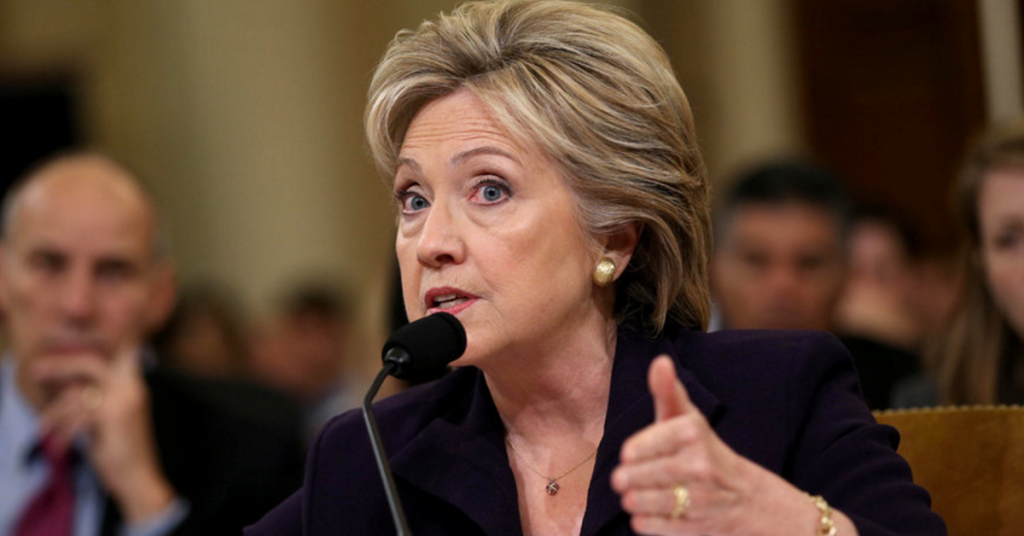
Hillary Clinton has questioned Bernie Sanders‘ electability. She’s criticized his plans for health care, foreign policy and Wall Street. And she’s tagged him with flip-flopping on gun control. None of it appears to be sticking, and that’s raising concerns among Democrats who fear that a months-long primary campaign could create lasting damage for their party. While most think Clinton will still capture the nomination, some say she is failing to respond effectively to Sanders, fueling both his primary rise and strengthening the Republican argument against her. Others say she got too a late of a start going after Sanders and is still not hitting him enough, eroding her lead in states that should be safe. “They didn’t take him seriously enough because they thought they had a gadfly,” said John Morgan, a Florida attorney and Clinton donor. “The gadfly wasn’t a gadfly, he was a lightning bug. And people have been following that lightning bug all over America.” Though Sanders has dismissed questions about Clinton’s use of a private email account and server as secretary of state and how she responded to the deadly 2012 Benghazi attacks, some Democrats say she needs a better response to his critique of her ties to Wall Street, which they argue reinforces months of Republican attacks on her character. “The better she does, the more those stories seem to recede in the minds of voters,” said Boston-based Democratic strategist Mary Anne Marsh. “Now, Benghazi seems to be back. Email seems to be back. A number of other things seem to be back.” Though the tightening nature of the race, particularly in Iowa, hasn’t sparked widespread panic among her supporters quite yet, it’s worrying some donors, as well as Bill Clinton and their daughter, Chelsea, who shared her concerns at a meeting with supporters in New York this week, according to people close to the campaign, who spoke on condition of anonymity because they were not authorized to discuss private conversations. Democratic donors, strategists and pollsters, including some aligned with Clinton, expressed their concerns in nearly two dozen interviews with The Associated Press. Clinton has long struggled to connect with liberal activists, who have gained influence as the party has shifted left during President Barack Obama’s two terms in office. “Clinton’s message has always been more effective for a general election audience than the primary activist base,” said strategist Ben LaBolt, a former Obama campaign aide. Sanders released a gauzy, uplifting ad on Thursday with images of his overflowing rallies over a soundtrack of Simon and Garfunkel’s “America.” The wordless spot contrasts with a recent Clinton ad New Hampshire that’s about her experience and plans. In recent days, Sanders has intensified his critique of Clinton with rhetoric that’s edged toward breaking one of his core campaign pledges: no attacks. “Without naming any names, Goldman Sachs also provides very, very generous speaking fees to some unnamed candidates,” he said this week in Iowa, meaning her. His argument hasn’t gone unnoticed by Republicans. The Republican National Committee jumped to Sanders’ defense during the last debate, blasting out emails undercutting her. It’s all a win-win for Republicans, potentially bolstering Sanders, who they see as the less formidable general election opponent, and reinforcing negative impressions of Clinton. Clinton’s campaign released a statement accusing Sanders of following Republican cues to go after her (as much as it seems the other way around). The campaign’s communications director, Jen Palmieri, said it’s obvious that Clinton is the candidate Republicans are afraid to face. During Sanders’ rise in the summer, Clinton’s campaign avoided criticizing Sanders out of fear that would alienate his liberal supporters who will be important to the Democratic nominee this fall. That hesitancy has changed in recent weeks. “No one has laid a glove on Bernie,” said Democratic Sen. Claire McCaskill of Missouri, a Clinton supporter who has warned about Sanders’ electability. “We like Bernie and he’s having a conversation we think is important so it’s not an easy thing to do.” She urged Democrats to think about the practicality of Sanders plans. “He is basing his candidacy on promises that in his gut he’s got to know can’t be kept because he’s got to work with Congress.” Recent preference polls suggest her lead in Iowa has evaporated and in New Hampshire, Sanders has opened up a significant edge. Clinton and her team believe they can still win the Feb. 1 caucuses in Iowa, arguing that her broader support will help her pick up more delegates, because of the proportional nature of their allocation in the state. Her strategists have long seen New Hampshire as a tougher race, given Sanders’ decades of representing a neighboring state. They’ve believed the nomination would be won in South Carolina, Nevada and the Southern states that vote on March 1. The larger numbers of minority voters in the later contests benefit Clinton, who’s consistently polled better among those groups. But even in Southern states, Democrats increasingly see a path for Sanders to cobble together a coalition of liberal whites, independents and younger black supporters. “Sanders organizers seem to be making some headway,” said Maryland Rep. Elijah Cummings, who says he’s likely to endorse Clinton. “What I’m hearing more and more is that (black voters) are now open to hearing Bernie.” And caucuses — which tend to reward liberal candidates — in March and in April in states such as Maine, Colorado and Wyoming could favor Sanders. “Nobody ever stops running for president, they just run out of money,” said former Indiana Sen. Evan Bayh, a Clinton fundraiser. “Bernie has enough money for a long time.” Republished with permission of the Associated Press.
Joe Biden on 2016 decision: ‘I regret it every day’
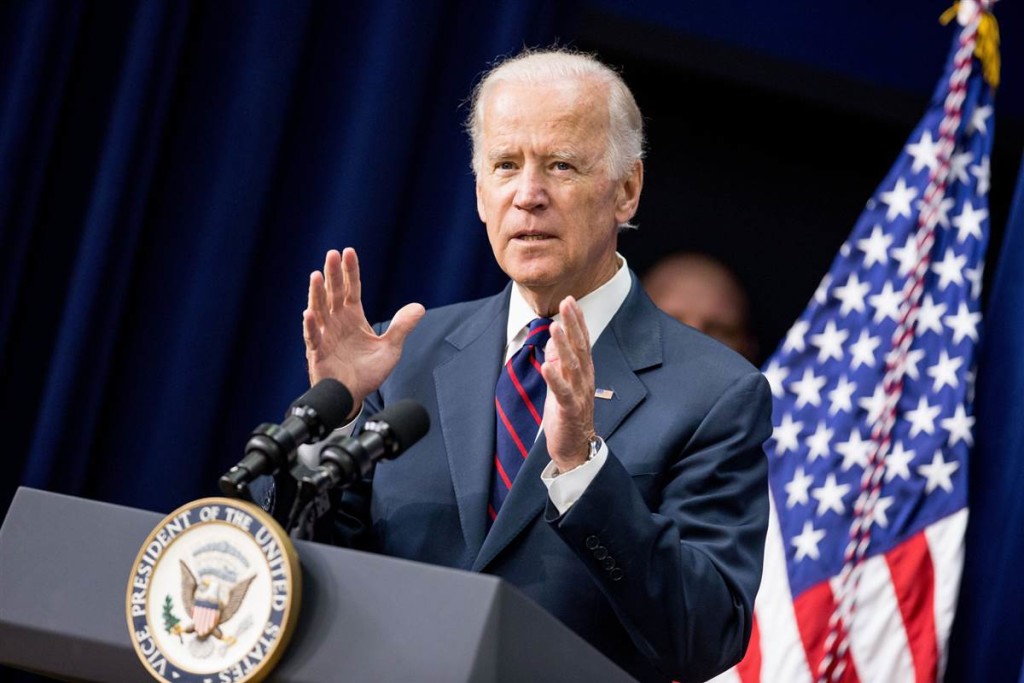
You can take Joe Biden out of the presidential campaign, but you can’t take the campaign out of Joe Biden. Three months after bowing out of the 2016 competition, the vice president has a few second thoughts about his decision. “I regret it every day,” Biden said Wednesday. Still, he said he made the right call for his family and for himself. And he pledged to stay “deeply involved” in the race to replace President Barack Obama. “We’ve got two good candidates,” Biden said, praising Hillary Clinton and Bernie Sanders for engaging in a “robust debate” devoid of personal attacks. He glossed over the third candidate running for the Democratic nomination, Martin O’Malley, whose campaign has struggled to gain traction. The vice president’s musings about the campaign he almost waged came in an interview with WVIT, one of five interviews Biden conducted to promote Obama’s executive actions on gun control. He told the Connecticut television station he was haunted by the thought of the 20 first-graders gunned down in Newtown — “those beautiful little babies in classrooms like dolls, discarded.” Turning to the Republican presidential primary, Biden said it had not been very illuminating so far. He singled out Donald Trump and Ted Cruz for comments they’ve made on the campaign trail. “I promise you, I’ve spoken to three of the presidential potential nominees on the Republican side who tell me, ‘Joe, it’s crazy,’” Biden said. “It’s absolutely crazy.” Biden spent months last year immersed in intensive deliberations with his political advisers and his family about whether to run for president a third time. Weighing heavily on his decision was his 46-year-old son Beau Biden’s death from brain cancer in May. In October, Biden announced that time had run out and that he wouldn’t run. Republished with permission of the Associated Press.
Hillary Clinton trying to light fire among Iowa activists
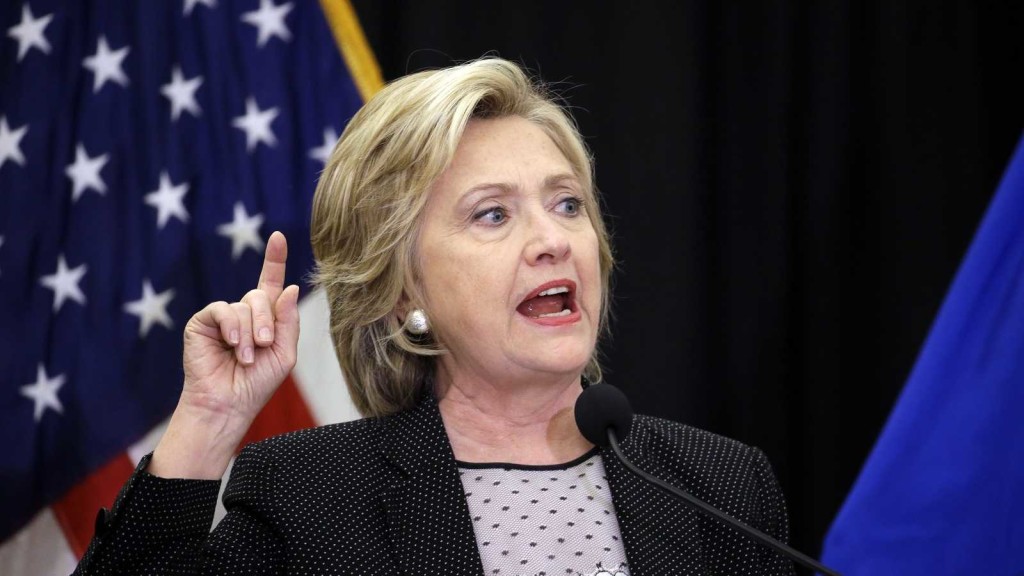
National polls notwithstanding, Hillary Clinton is guarding against complacency as she travels along the snow-covered fields of Iowa. “I need you,” she says repeatedly on the rope-line between handshakes and selfies. Wary of another mishap in Iowa, Clinton is preaching a message of urgency, challenging her supporters to dig in during the final month before the state’s lead-off presidential caucus. She casts her candidacy as a check against Republicans and avoids mentioning her main Democratic rival, Bernie Sanders, whose polling numbers remain at striking distance. “We can’t take anything for granted,” Clinton said at Des Moines’ State Historical Museum Monday night, a replica of a massive wooly mammoth looming off to the side as she spoke. “It doesn’t happen just because we wish it. It doesn’t happen because it’s inevitable.” Clinton’s presidential bid faltered in Iowa in 2008, when she finished third against then-Sens. Barack Obama and John Edwards. She defeated Obama in the New Hampshire primary but the future president prevailed after outlasting Clinton in a series of contests during the spring. This time, Clinton has built a formidable team of field organizers around Iowa, mindful of the ground game edge that Obama had in the state in 2007 and 2008. Polls have shown Sanders leading in New Hampshire, his neighbor to the east, giving Clinton little margin for error here. If the former secretary of state stumbles in Iowa again and is defeated by Sanders in New Hampshire, it would almost certainly renew worries about her ability to unify the party’s liberal and moderate factions. She enjoys strong support among Latino and black voters who are pivotal in Nevada and South Carolina, the third and fourth contests, but consecutive losses might diminish her standing. “If I get off to a good start here in Iowa, we’re halfway home,” Clinton said in Davenport. During a stop Tuesday night in Council Bluffs, she urged Democrats to consider a candidate’s “electability and how we make sure we have a Democrat going back in the White House in January 2017.” Few and far between are the days between now and the Feb. 1 caucuses in which Clinton or one of her messengers aren’t scheduled to campaign around Iowa. Former President Bill Clinton will be in Cedar Rapids and Dubuque on Thursday on behalf of his wife, and is certain to return. Her team is also dispatching backers like Virginia Gov. Terry McAuliffe, a top adviser during her 2008 campaign, and actress Lena Dunham of HBO’s “Girls” in the coming days. “Nobody’s complacent because of the 2007 and 2008 experience. This is not a done deal,” said Agriculture Secretary Tom Vilsack, a former Iowa governor introducing Clinton at events on Monday. “I like what she’s doing — she’s reminding people what’s at stake here. That’s a motivating factor.” Much of Clinton’s message revolves around defending Obama’s legacy. She warns that a Republican president would repeal Obama’s health care law, slash taxes on the wealthy, and undercut executive actions on gun violence and pollution. Part of her goal is to make a personal connection with voters over issues, as she puts it, “that keep families up at night.” In Sioux City on Tuesday, she rolled out a new initiative to provide more federal resources for 3.5 million Americans with autism. Last month, she announced a $2 billion plan to address Alzheimer’s during a stop in Fairfield, Iowa, and she frequently talks about substance abuse and mental health problems at events. Democrats say Sanders appears to have made a more emotional connection with his supporters — even though polls show him trailing here — while Clinton is viewed as the party’s standard-bearer and favorite to win the nomination. “He seems more genuine,” said Dan McCarthy of Bettendorf, a defense worker who spoke about Sanders as he sat with his mother before a Clinton event in Davenport. “I don’t like the idea of having the same people over and over again. You’re not going to change anything.” McCarthy said he was supporting the Vermont senator while his mother, Joan, said she was still assessing the Democratic field. But Clinton’s argument brought at least one fence-sitter onto her side in Des Moines. “To me, it’s who is more electable,” said Al Hart, a retired social studies teacher from Ankeny who said he decided to support Clinton after listening to her speech at the museum. “I think she’s got the fire in belly to get elected. She’s been through this before.” Grant Woodard, a Des Moines lawyer and veteran of several Democratic campaigns, said the size of the caucus would play a major role given Sanders’ attempt to attract college students and first-time caucus-goers. Most expect it to fall somewhere between 2008’s record of about 240,000 and the 125,000 who participated in 2004. “Sanders people are more motivated but I am not sure there’s enough of them,” Woodard said. As for Clinton, he said the challenge was simple: “How do you keep them motivated when folks think this is in the bag?” Republished with permission of the Associated Press.
Hillary Clinton commemorates boycotts, says U.S. must address injustice

Standing in the pulpit where the Rev. Martin Luther King Jr. led the historic Montgomery bus boycott, Democratic presidential candidate Hillary Clinton reached out to black voters Tuesday saying the U.S. is still plagued by injustices such as mass incarceration and attempts to roll back voting rights- and she urged Americans to rebuild their bonds with one another. “We must be honest about the larger and deeper inequalities that continue to exist across our country,” Clinton told a majority black crowd at the Dexter Avenue King Memorial Baptist Church at an event commemorating the boycott. In a speech on the 60th anniversary of Rosa Parks‘ Dec. 1, 1955, arrest for refusing to give her bus seat to a white passenger, Clinton praised the heroes of the civil rights movement, but said much remains to be done. “Our work isn’t finished. We must pay it forward. There are still injustices perpetuated every day in our country, sometimes in spite of the law, sometimes, unfortunately, in keeping with it,” Clinton said. King preached his Sunday sermons at the church from 1954 to 1960 and was catapulted onto the national stage by the boycott. King’s daughter, Bernice King, gave the benediction after Clinton’s speech. Clinton has made frank discussion about the country’s lingering racism a central theme of her primary campaign, in an effort to woo the coalition of minority, young, and female voters who twice catapulted Barack Obama into the White House. In recent months, she’s met with the families of young black people killed in police shootings and held conversations with Black Lives Matter protesters. She’s rolled out policies aimed at revamping the criminal justice system, an issue that she and her rivals – Vermont Sen. Bernie Sanders and former Maryland Gov. Martin O’Malley – each pitch as they court black voters who will help choose a nominee. Clinton is working to solidify her advantage over Sanders, her closest rival, among African-Americans. Black voters could make up more than half of the primary electorate in the early voting state of South Carolina and several other Southern states, including Alabama, that hold March primaries. She told the crowd that mass imprisonment of nonviolent criminals such as drug offenders does little to reduce crime, but much to rip apart families. “Right now an estimated 1.5 million black men are missing from their families and communities because of incarceration and premature death. And too many black families mourn the loss of a child,” she said. Clinton praised the work of police who build trust and confidence with the public, but she called for reforms and “a new course in how we approach punishment and prison.” Clinton also decried what she called efforts to erode the voting rights that minorities won decades ago in the civil rights movement. “Unfortunately, there is mischief afoot and some people are just determined to do what they can to keep other Americans from voting,” Clinton said. Invoking King’s words, that love and justice are intertwined, Clinton challenged Americans to examine themselves and their own preconceived notions and try to reach a greater understanding with others who may not look, or think, like them. “We each need to do the hard work of rebuilding our bonds with one another. This isn’t just about strengthening ties between police and citizens, although that is very important. It’s about strengthening ties across society, between neighbors, colleagues, even among people with whom we profoundly disagree,” Clinton said. A crowd formed a line Tuesday morning for the 300 seats in the small church, decorated with garlands and poinsettias for Christmas. “She is going to be president,” retired elementary school principal Maggie Stringer, 80, said emphatically. “At least I can say I did see her and I’ve been in her presence.” Stringer was a 20-year-old student and a member of the church during the Bus Boycott. “Oh, the energy. As someone said, the cup was full. It just spilled out and it seemed like it reached everybody,” Stringer said. Republished with permission of The Associated Press.
Hillary Clinton to speak at Montgomery bus boycott anniversary event
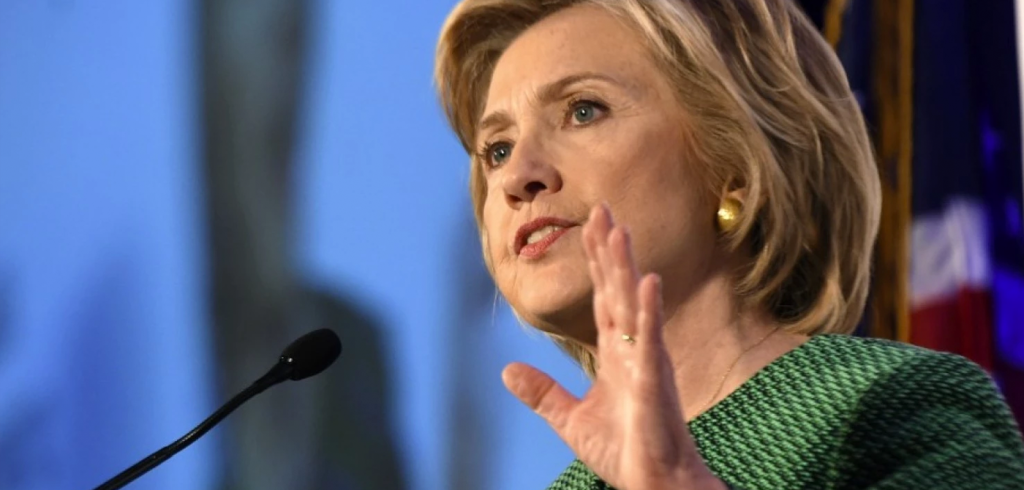
Democratic presidential candidate Hillary Clinton is traveling to Alabama to mark the 60th anniversary of the Montgomery Bus Boycott. Clinton will speak Tuesday morning at the Montgomery, Alabama, church pastored by the Rev. Martin Luther King Jr. during the boycott. Her speech falls on the anniversary of Rosa Parks‘ Dec. 1, 1955 arrest for refusing to give her bus seat to a white passenger. Her arrest sparked the 381-day boycott of Montgomery buses by blacks to protest segregated seating. In stops in the South, the Democratic presidential front-runner has been working to solidify her advantage among African-American voters. Black voters make up a major portion of the Democratic primary electorate in Southern states holding early primaries in 2016. Republished with permission of The Associated Press.
Hillary Clinton names Terri Sewell, legislative Dems to state campaign committee

Democratic presidential candidate Hillary Rodham Clinton named a slew of progressive Alabamians to her state campaign committee on Friday, which she is calling the “Alabama Leadership Council.” Among the most powerful members of the 60-member council of supporters is U.S. Rep. Terri Sewell, a Democratic congresswoman and the first black woman to represent Alabama in Congress. A number of state lawmakers in Montgomery also made the list, including Sen. Vivian Davis Figure, Rep. Napolean Bracy, and Rep. James Buskey. Longtime supporter and former state co-chair Pat Edington also made the list, as did Vivian Beckerle and Timothy Bolden. The list of Hillary-supporting Yellowhammer State Democrats also includes several party insiders who also cast a vote in the party’s nominating convention. Observers say her path to victory includes running an extensive behind-the-scenes campaign for her party’s delegates, of whom reports say she has racked already secured half. Clinton made a handful of campaign stops in Alabama last week, ahead of her designation of campaign committee members. She weighed in on the closure of several state driver’s license offices – an issue championed by Sewell – last month as well, calling the move “a blast from the Jim Crow past.” Democrats’ chances of winning carrying Alabama’s are slim to none. The last time the state voted for a Democratic president was in 1976, when then-Georgia Gov. Jimmy Carter captured the state’s support.


